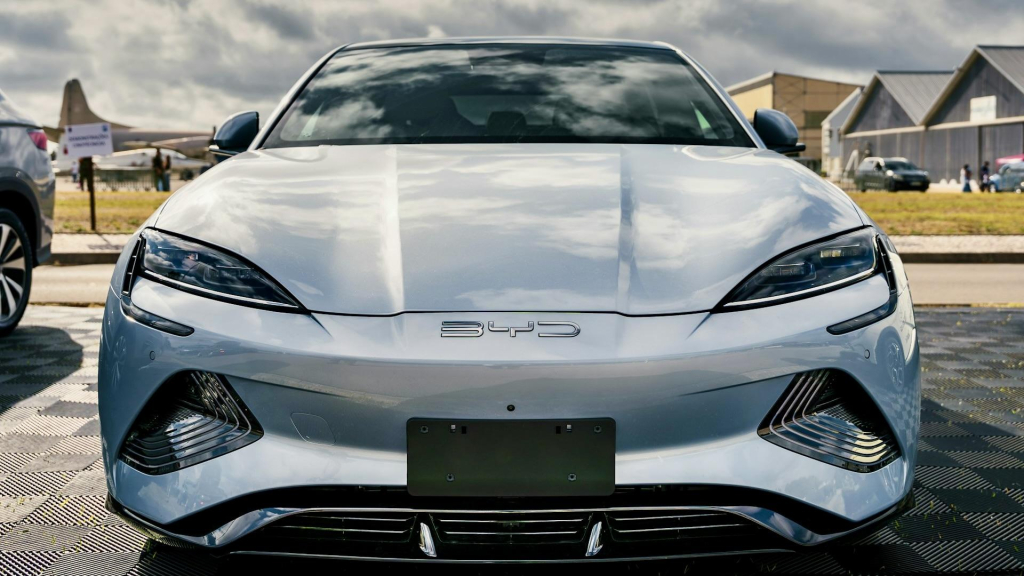BYD’s November sales crossed 506,000, pushing its 2024 total near 3.8 million. With a 70% surge in hybrid sales, the Chinese EV leader is closing the gap with Honda and Ford in a transformative year for the auto industry.
BYD's Record-Breaking November Sales Propel It Toward 4 Million Target
After selling over 500,000 vehicles last month, BYD, the electric vehicle behemoth from China, is well on its way to smashing its 4 million vehicle sales goal for 2024.
Data submitted to the Hong Kong stock exchange on Monday showed that the Chinese automaker sold 506,804 vehicles in November.
Its overall sales thus far this year amount to 3,757,336 pieces. Current sales are up 40% over the same period last year. The spike is mostly being propelled by plug-in hybrids; in the first eleven months of the year, BYD sold slightly under 2.2 million hybrids, an increase of about 70% compared to the previous year.
Honda and Ford Face Stiff Competition From BYD
Per Yahoo Finance, assuming BYD maintains its current rate of growth until the year's last month, the Chinese automaker has a good chance of competing with, and maybe even surpassing, more established brands like Honda of Japan and Ford of the United States.
Recent statistics from the Japanese carmaker Honda show sales of 3.11 million units from January through October. That's about in line with what Honda sold in 2023, when they sold slightly under 4 million cars.
The first three quarters of 2024 saw Ford sell 3.3 million automobiles. Selling 4.3 million automobiles in 2024 is the projected rate for the American automaker. In 2023, 4.4 million vehicles were sold by Ford.
BYD's EV Sales Outpace Tesla's Battery-Powered Vehicles
U.S. electric vehicle manufacturer Tesla delivered 1.3 million battery-powered vehicles in the first nine months of the year, which is somewhat more than BYD's 1.2 million sales in the same time frame. In 2023, 1.81 million automobiles were sold by Tesla.
While BYD is far and away the market leader in electric vehicles, it still has a ways to go before it can compete with Toyota and Volkswagen, the two largest automakers in the world.
In the first ten months of 2024, 8.3 million automobiles were sold by Toyota, excluding its subsidiaries Daihatsu and Hino.
Foreign Automakers Struggle Amidst China's EV Revolution
The Chinese market for electric vehicles is quite competitive, and foreign automakers are finding it difficult to compete. New energy vehicles, which comprise ICE cars as well as plug-in hybrids and battery electric vehicles, are quickly becoming the preferred choice of Chinese consumers.
U.S. automaker GM acknowledged last week that it would lose more than $5 billion due to restructuring expenses and plant closures as a result of its poor performance in China.
General Motors was among China's best-selling automakers just over a decade ago, but CEO Mary Barra claims the country's sudden transition to electric vehicles has created a "race to the bottom" in the industry.
Volkswagen, Honda, and Nissan Adjust Strategies in China
A number of other international automakers are reducing their presence in the Chinese market. With "economic reasons" as the stated explanation, the world's number two carmaker, Volkswagen, pulled out of Xinjiang at the tail end of last month. The involvement of Volkswagen in the Chinese province was contentious, with Western nations accusing Beijing of human rights abuses against the Uyghur majority.
Along with Stellantis, Honda, and Nissan, ICE vehicle manufacturers in China are reorganizing their production processes, which includes laying off workers and closing plants.



 Gold and Silver Prices Rebound After Volatile Week Triggered by Fed Nomination
Gold and Silver Prices Rebound After Volatile Week Triggered by Fed Nomination  India–U.S. Interim Trade Pact Cuts Auto Tariffs but Leaves Tesla Out
India–U.S. Interim Trade Pact Cuts Auto Tariffs but Leaves Tesla Out  Japanese Pharmaceutical Stocks Slide as TrumpRx.gov Launch Sparks Market Concerns
Japanese Pharmaceutical Stocks Slide as TrumpRx.gov Launch Sparks Market Concerns  Australian Pension Funds Boost Currency Hedging as Aussie Dollar Strengthens
Australian Pension Funds Boost Currency Hedging as Aussie Dollar Strengthens  Dow Hits 50,000 as U.S. Stocks Stage Strong Rebound Amid AI Volatility
Dow Hits 50,000 as U.S. Stocks Stage Strong Rebound Amid AI Volatility  RBI Holds Repo Rate at 5.25% as India’s Growth Outlook Strengthens After U.S. Trade Deal
RBI Holds Repo Rate at 5.25% as India’s Growth Outlook Strengthens After U.S. Trade Deal  UK Starting Salaries See Strongest Growth in 18 Months as Hiring Sentiment Improves
UK Starting Salaries See Strongest Growth in 18 Months as Hiring Sentiment Improves  Russian Stocks End Mixed as MOEX Index Closes Flat Amid Commodity Strength
Russian Stocks End Mixed as MOEX Index Closes Flat Amid Commodity Strength  Trump Signs Executive Order Threatening 25% Tariffs on Countries Trading With Iran
Trump Signs Executive Order Threatening 25% Tariffs on Countries Trading With Iran  Australian Household Spending Dips in December as RBA Tightens Policy
Australian Household Spending Dips in December as RBA Tightens Policy  Nikkei 225 Hits Record High Above 56,000 After Japan Election Boosts Market Confidence
Nikkei 225 Hits Record High Above 56,000 After Japan Election Boosts Market Confidence  Trump Lifts 25% Tariff on Indian Goods in Strategic U.S.–India Trade and Energy Deal
Trump Lifts 25% Tariff on Indian Goods in Strategic U.S.–India Trade and Energy Deal  Yen Slides as Japan Election Boosts Fiscal Stimulus Expectations
Yen Slides as Japan Election Boosts Fiscal Stimulus Expectations  Indian Refiners Scale Back Russian Oil Imports as U.S.-India Trade Deal Advances
Indian Refiners Scale Back Russian Oil Imports as U.S.-India Trade Deal Advances  U.S.-India Trade Framework Signals Major Shift in Tariffs, Energy, and Supply Chains
U.S.-India Trade Framework Signals Major Shift in Tariffs, Energy, and Supply Chains  Japan Economy Poised for Q4 2025 Growth as Investment and Consumption Hold Firm
Japan Economy Poised for Q4 2025 Growth as Investment and Consumption Hold Firm  China Extends Gold Buying Streak as Reserves Surge Despite Volatile Prices
China Extends Gold Buying Streak as Reserves Surge Despite Volatile Prices 































